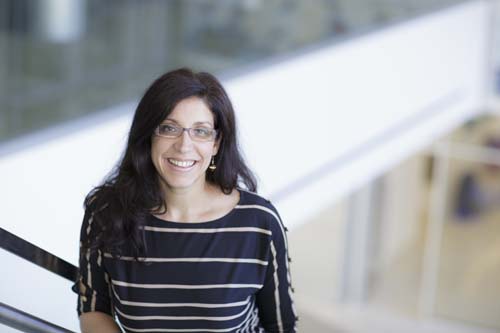A boat named Opportunity
Professor uses her symbolic past to inspire her future
By Brittany Valencic

Yenisel Cruz-Almeida, Assistant Professor, Department of Aging and Geriatric
Research, UF Institute on Aging
Ever since she can remember, Yenisel Cruz-Almeida, Ph.D., can recall her parents talking about leaving Cuba.
But during the 1990s, leaving the communist island was considered a crime, especially if you held a professional job in the community. This left her family with no resources to leave the country legally.
So, they plotted to escape.
Using money they saved up, the family bought a small boat and made connections with others who were trying to flee as well.
Cruz-Almeida’s father learned everything he could about raft building; using large truck tires and military-grade canvas, he designed a raft to allow his family to escape the Cuban coastline. And in 1993, when Cruz-Almeida was 14 years old, her family headed toward the United States, Cruz-Almeida said.
Her family set off to brave the 90-mile stretch of water that sits between Cuba and Florida. They were met with numerous dangers at every stage of their three-day journey — shark-infested waters, brutal tidal waves and an exhaustion of clean drinking water. But when their boat’s engine broke and water started flooding into the bottom, Cruz-Almeida said they were in need of a miracle.
“We’re dying one moment, there are sharks surrounding us in this 19-foot boat and water is coming in and then this boat appears out of nowhere,” Cruz-Almeida said. “And the boat’s name was Opportunity.”
Although the Opportunity could not take Cruz-Almeida and her family onboard, they called the U.S. Coast Guard. She and her family were rescued about 17 miles off of Key West. To Cruz-Almeida, the name of the boat that saved her family has a deeper meaning.
“To me it’s symbolic,” she said. “This white boat was named Opportunity and my dad was always saying the reason we needed to get out of Cuba … was because we didn’t have any opportunities there. That here, we would have the opportunity to be whatever we wanted to be.”
Cruz-Almeida, who said she always wanted to be a scientist, never stopped seizing opportunities once she came to the United States. After studying microbiology and cell science at UF for her undergraduate degree, she received her Ph.D. in neuroscience, studying pain associated with spinal cord injuries at the University of Miami.
Now, she is an assistant professor in the UF College of Medicine’s Institute on Aging. Her research focuses on the neurobiology and neuroscience of pain and aging.
It was largely the message that the boat Opportunity held that has helped her get where she is and has motivated her, she said.
“You just have to be positive and persevere,” Cruz-Almeida said. “Know what you want to do.”
This is a lesson she tries to instill in her students as well. Cruz-Almeida said she thinks part of her job is to be able to mentor younger people and really help them.
“This is where you can make an impact, and I’m fortunate because I’m in a place where I do get to have an impact on people and it’s real and measurable,” she said. “And it’s beyond my own success. I feel like that is very powerful.”
The desire to help others carries over to her area of research as well. Cruz-Almeida’s interest in pain research stemmed from the fact that so many people have chronic pain and there is no treatment for it.
“In relation to pain, there is not a lot doctors can do because we don’t know what will work in any individual patient,” she said. “That’s why I decided to put my energy into what’s going on at a neurobiological level so we can develop better treatments.”
Cruz-Almeida strives to understand the link between specific circuitries in the brain and one’s pain experience. In her lab, she tries to discover if certain circuitries are maladaptive or dysfunctional and if this can predict the pain that people have as they get older, she said.
“We have the capability of either magnifying or reducing our own pain experience and that’s the key to trying to figure out how we can either target interventions or how we can ourselves modify the pain we feel,” Cruz-Almeida said.
Through her research, she hopes to impact how people see and treat pain so that its burden can be reduced.
“We can do whatever we set our mind to,” she said. “I truly believe in that.”
